South Carolina Homeschool Code of Laws
There are three accountability options in SC which you may use to homeschool.
We encourage you to read the code of laws for yourself.
Option 1 is through your local school district and is covered in Section 59-65-40.
Option 2 is through SCAIHS and is covered in Section 59-65- 45.
Option 3 is through an independent Homeschool Association and is covered in Section 59-65-47.
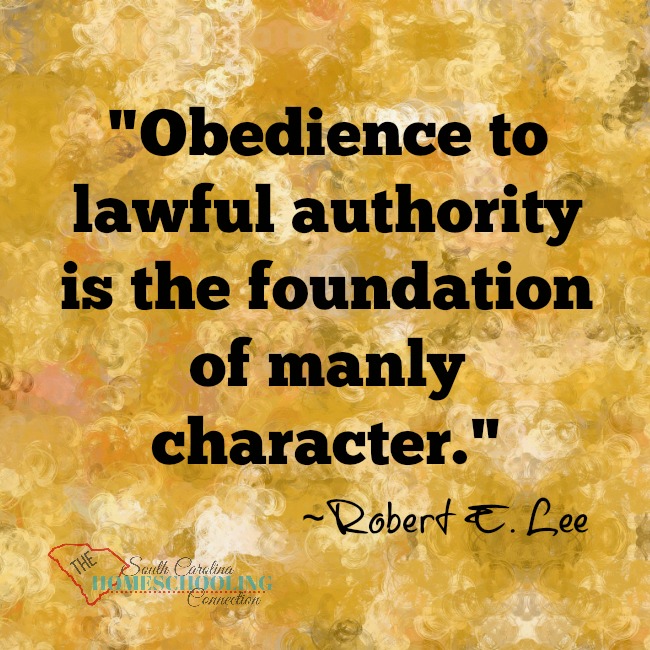
Title 59 – Education CHAPTER 65
ATTENDANCE OF PUPILS ARTICLE 1
“Option 1”: COMPULSORY ATTENDANCE SECTION 59-65-40
Home schooling programs
Parents or guardians may teach their children at home if the instruction is approved by the district board of trustees of the district in which the children reside. A district board of trustees shall approve home schooling programs which meet the following standards:
(1) the parent:
(a) holds at least a high school diploma or the equivalent general educational development (GED) certificate or (b) has earned a baccalaureate degree;
(2) the instructional day is at least four and one-half hours, excluding lunch and recesses, and the instructional year is at least one hundred eighty days;
(3) the curriculum includes, but is not limited to, the basic instructional areas of reading, writing, mathematics, science, and social studies and in grades seven through twelve, composition and literature;
(4) as evidence that a student is receiving regular instruction, the parent shall present a system for maintaining and maintain the following records for inspection upon reasonable notice by a representative of the school district: (a) a plan book, diary, or other written record indicating subjects taught and activities in which the student and parent engage;
(b) a portfolio of samples of the student’s academic work; and
(c) a record of evaluations of the student’s academic progress. A semiannual progress report including attendance records and individualized assessments of the student’s academic progress in each of the basic instructional areas specified in item (3) must be submitted to the school district.
(5) students must have access to library facilities;
(6) students must participate in the annual statewide testing program and the Basic Skills Assessment Program approved by the State Board of Education for their appropriate grade level. The tests must be administered by a certified school district employee either with public school students or by special arrangement at the student’s place of instruction, at the parent’s option. The parent is responsible for paying the test administrator if the test is administered at the student’s home; and
(7) parents must agree in writing to hold the district, the district board of trustees and the district’s employees harmless for any educational deficiencies of the student sustained as a result of home instruction. At any time the school district determines that the parent is not maintaining the home school program in keeping with the standards specified in this section the district board of trustees shall notify the parent to correct the deficiencies within thirty days. If the deficiencies are not corrected within thirty days, the district board of trustees may withdraw its approval.
(B) The district board of trustees shall provide for an application process which elicits the information necessary for processing the home schooling request, including a description of the program, the texts and materials to be used, the methods of program evaluation, and the place of instruction. Parents must be notified in advance of the date, place, and time of the meeting at which the application is considered by the board and parents may be heard at the meeting.
(C) Within the first fifteen instructional days of the public school year, students participating in home instruction and eligible for enrollment in the first grade of the public schools must be tested to determine their readiness for the first grade using the readiness instrument approved by the State Board of Education for public school students. If a student is determined to be “not ready” or is determined to lack the necessary emotional maturity, the parent must be advised by appropriate school district personnel whether a kindergarten or a first grade curriculum should be used for the child. Nothing in this section may be interpreted to conflict with a parent’s right to exempt his child from kindergarten as provided in Section 59-65-10(A).
(D) Should a student in a home schooling program score below the test requirements of the promotion standard prescribed for public school students by the State Board of Education for one year, the district board of trustees shall decide whether or not the student shall receive appropriate instructional placement in the public school, special services as a handicapped student, or home schooling with an instructional support system at parental expense. The right of a parent to enroll his child in a private or parochial school as provided in Section 59-65-10(A) is unaffected by this provision.
(E)If a parent is denied permission to begin or continue home schooling by a district board of trustees, the decision of the district board of trustees may be appealed, within ten days, to the State Board of Education. Any appeal from the decision of the State Board of Education must be taken, within thirty days, to the family court.
“Option 2”: SECTION 59-65-45
Alternative home schooling requirements
In lieu of the requirements of Section 59-65-40, parents or guardians may teach their children at home if the instruction is conducted under the auspices of the South Carolina Association of Independent Home Schools. Bona fide membership and continuing compliance with the academic standards of South Carolina Association of Independent Home Schools (SCAIHS) exempts the home school from the further requirements of Section 59-65-40.
The State Department of Education shall conduct annually a review of the association standards to insure that requirements of the association, at a minimum, include:
(a) a parent must hold at least a high school diploma or the equivalent general educational development (GED) certificate;
(b) the instructional year is at least one hundred eighty days; and
(c) the curriculum includes, but is not limited to, the basic instructional areas of reading, writing, mathematics, science, and social studies, and in grades seven through twelve, composition and literature.
By January thirtieth of each year, the South Carolina Association of Independent Home Schools shall report the number and grade level of children home schooled through the association to the children’s respective school districts.
SECTION 59-65-46
Home schooling of foster child
A foster parent may teach a foster child at home as provided in Sections 59-65-40, 59-65-45, or any other provision of law, if, in addition to any other requirements, home schooling of the child has been approved by the Department of Social Services or other agency having custody of the child.
“Option 3”: SECTION 59-65-47
Associations for home schools; requirements
In lieu of the requirements of Section 59-65-40 or Section 59-65-45, parents or guardians may teach their children at home if the instruction is conducted under the auspices of an association for home schools which has no fewer than fifty members and meets the requirements of this section. Bona fide membership and continuing compliance with the academic standards of the associations exempts the home school from the further requirements of Section 59-65-40 or Section 59-65-45.
The State Department of Education shall conduct annually a review of the association standards to ensure that requirements of the association, at a minimum, include:
(a) a parent must hold at least a high school diploma or the equivalent general educational development (GED) certificate;
(b) the instructional year is at least one hundred eighty days;
(c) the curriculum includes, but is not limited to, the basic instructional areas of reading, writing, mathematics, science, and social studies, and in grades seven through twelve, composition and literature; and (d) educational records shall be maintained by the parent-teacher and include:
(1) a plan book, diary, or other record indicating subjects taught and activities in which the student and parent-teacher engage;
(2) a portfolio of samples of the student’s academic work; and
(3) a semiannual progress report including attendance records and individualized documentation of the student’s academic progress in each of the basic instructional areas specified in item (c) above.
By January thirtieth of each year, all associations shall report the number and grade level of children home schooled through the association to the children’s respective school districts.
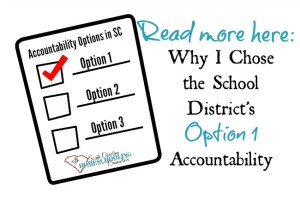
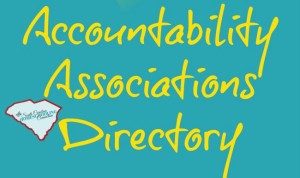
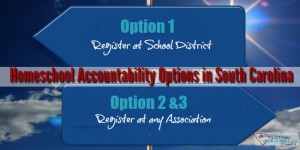
 When is the Deadline to Renew Your Homeschool Registration?
When is the Deadline to Renew Your Homeschool Registration?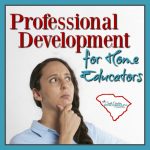 Professional Development For Home Educators
Professional Development For Home Educators SC Homeschool Numbers 2014-2015
SC Homeschool Numbers 2014-2015 College Preview Days: Fall 2016
College Preview Days: Fall 2016




[…] See the Complete List of Option 3 Associations Read the SC Code of Laws […]